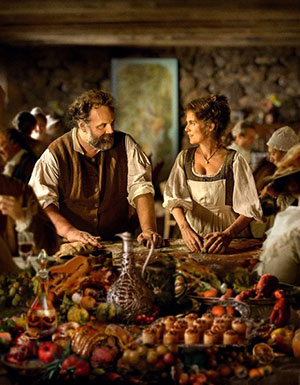On the eve of the French Revolution, a disgraced chef finds his true calling when he opens France’s first restaurant.
To help keep this site running: Willow and Thatch may receive a commission when you click on any of the links on our site and make a purchase after doing so.
The 2021 French-language historical comedy “Delicious,” starring Grégory Gadebois and Isabelle Carré, is a mouthwatering ode to community built through culinary appreciation.
“Delicious” (2021) is AVAILABLE to STREAM
In 1789 France, chef Pierre Manceron (Grégory Gadebois) takes pride in the immense feasts he creates for his employer, the self-satisfied Duc de Chamfort (Benjamin Lavernhe).
Deprived of all political power, members of the aristocracy have nothing to do aside from indulging their hedonistic whims, and the Duc finds his outlet through good food. But Pierre goes too far when he decides to present to the Duc’s guests a startling new dish, slices of truffle and potato wrapped in a delicate pastry.
Today it sounds delicious–a flirtatious kitchen maid literally deems it so–but to eighteenth-century aristocrats, the idea of eating food from the ground was akin to heresy. Embarrassed in front of his guests, the Duc unceremoniously fires Pierre.
Forced to take refuge at his father’s relay (the eighteenth-century version of a highway rest stop), Pierre and his son Benjamin (Lorenzo Lefèbvre) try to make the best of things. While Pierre mopes and refuses to cook, while Benjamin plies travelers with terrible vegetable soup in exchange for the latest details on the revolutionary fervor building in Paris.
When a mysterious woman, Louise (Isabelle Carré), arrives at the relay and demands to become Pierre’s apprentice, the grumpy chef begins to rediscover his love of cooking.
It’s not until the Duc presents an opportunity for a fresh start that he begins to re-evaluate his choices. Should Pierre apologize and return to the Duc’s court? Or should he strike out on his own and open the first restaurant in France?
Given the film’s humor, revolutionary backdrop, and the Duc’s villainous persona, it’s clear where “Delicious” is heading. But director Éric Besnard treats his main characters with such gentleness and understanding that it doesn’t matter. Even if we think we know the ending, we want to see where life takes Pierre, Louise, and Benjamin. They’ve all been damaged by the corrupt aristocracy in some way, and we root for them to succeed.
Louise and Benjamin take the lead in molding the relay into what we’d recognize today as a restaurant. They decide to list the day’s menu on a chalkboard, so patrons know what to expect; they lay place settings in advance, so diners are ready to eat as soon as they sit down. Besnard handles these moments with a light touch, which keeps the story moving. The only off-putting scene comes when Louise and Benjamin, given free rein over the relay, invent both sliced bread and French fries. “It’ll never catch on,” Pierre grumbles as he pops a fried potato into his mouth. This sort of knowing wink and nod to the modern viewer can take them right out of the story, and thankfully it only happens once.
If it were possible to actually taste food in films, “Delicious” would doubtless earn three Michelin stars. Cinematographer Jean-Marie Dreujou brings Pierre’s dishes to vibrant, gorgeous life, lavishing attention on even the smallest details. Sprinkled flour falls through the air like snow, and roasting quail glisten by the light of the fire. Breathtaking shots of tables groaning with food echo painted still-lifes and punctuate turning points in the story. Even a wooden serving board set with foraged wild vegetables is given the same detailed attention.
By the end of the film, we truly believe that Pierre’s food is good enough to launch the first French restaurant. Whether or not that’s actually true, it’s a heartwarming journey that will send you straight into the kitchen (or your takeout menus) to satisfy your cravings. Délicieux!
“Delicious” (2021) is AVAILABLE to STREAM
Rated 13+
Abby Murphy writes young adult books about girls discovering their strengths. A member of SCBWI and The Historical Novel Society, she is represented by Laura Crockett of Triada US Literary Agency. You can visit her blog here, where she writes about reading, writing, history, and her incurable Anglophilia.
If you enjoyed this post, wander over to The Period Films List. You’ll especially like the Best Period Dramas: Georgian and Regency Era list. Also see our review of The Cook of Castamar, and Fannie’s Last Supper.

